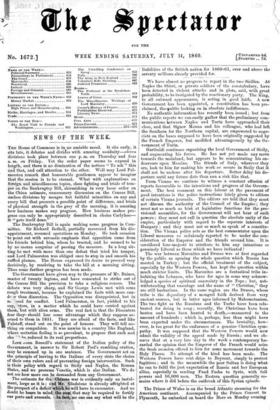NEWS 01? THE WEEK.
THE House of Commons is in no amiable mood. It sits early, it sits late, it debates and divides with amazing assiduity—eleven divisions took place between one p. m. on Thursday and four a. m. on Friday. Yet the order paper seems to expand in length, and there is no diminution of the notices " To ask " this and. that,. and call attention to the other. Well may Lord Pal- merston remark that honourable gentlemen appear to imagine that the session is to be eternal. What with explanations on foreign and miscellaneous topics, close fighting and trials of tem- per on the Bankruptcy Bill, skirmishing in very loose order on the China estimate, unnecessary discussion on the Census Bill, useless divisions by meagre but faithful minorities on any and every bill that presents a possible point of difference, and trials of physical strength in the grey of the morning, it is amazing how business makes any progress. How business makes pro- gress can only be appropriately described in choice Carlylese- it " gets itself done."
The Bankruptcy Bill is again making some progress in Com-: mittee. Sir Richard Bethel, partially recovered froth' his dis- appointment, resumed operations on Monday. He took occasion to point out with sarcastic emphasis that opposition came from his friends behind him, whom he trusted, and he seemed to be by no means sanguine of passing the measure. In a long sit- ting_he met with more than one defeat that tried his temper, - and Lord Palmerston was obliged once to step in and smooth his ruffled plumes. The House expressed its desire to proceed very decisively, by resolving to take the bill at a morning sitting. Thus some further progress has been made.
The Government have given way to the pressure of Mr. Baines, master of twenty legions, and have consented to strike out of the Census Bill the provision to take a religious census. The debate was very sharp, and Sir George Lewis met with some rough treatment, because he explained the facts with more can- tle 'r than discretion. The Opposition was disappointed, but in ni. •tood for conflict. Lord Palmerston, in fact, yielded to his supi\ters, in a matter which he could have carried against them,, ,but with alien arms. The real fact is that the Dissenters fear they- should lose some advantage which they suppose ac- crued to them in 1851. They are afraid of the facts, and like Falstaff, stand out on the point of honour. They will tell no- thing on compulsion. It was unwise in a country like England, where sectarian feeling is so prevalent, to propose that each sect sho ' ' he_reduced to its real proportions.
Lord JO= Russell's statement of the Italian policy of the Government, in answer to Sir Robert Peel's rambling oration, may be summed up in one sentence. The Government act on the principle of leaving to the Italians of every state the choice of their own rulers and.of preventing foreign intervention. Such is their policy with regard to Sicily and Naples, the Roman States, and we presume Venetia, which is also Italian. We do • not see how more can be demanded from any Government. The estimate for the Chinese war is evidently only an instal- ment, large as it is ; and Mr. Gladstone is already affrighted at the prospect of a deficit which he will have to encounter. And no doubt he bears in mind the sum that may be required to fortify, our ports and arsenals. In fact, no one can my what will be the
liabilities of the British nation for 1860-61, over and above the seventy millions already provided for.


























